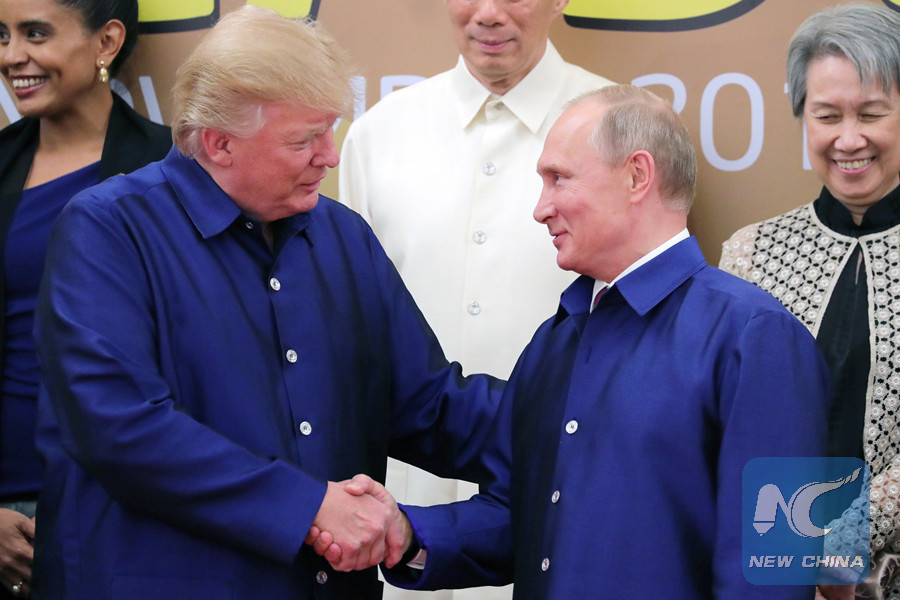
U.S. President Donald Trump and his Russian counterpart Vladimir Putin meet on the margins of the Asia-Pacific Economic Cooperation (APEC) Economic Leaders' Meeting in Da Nang, Vietnam on Nov. 11, 2017 (Xinhua/Klimentyev Mikhail)
ISTANBUL, Nov. 14 (Xinhua) -- The deal struck by Russian and U.S. leaders last week on settling the crisis in Syria is a blow to Turkey, forcing Ankara to overhaul its position about how to navigate the Arab country out of a war that has raged on for years, analysts told Xinhua.
The U.S.-Russian joint statement created the impression that Turkey has been left out of the game in Syria, observed Cahit Armagan Dilek, director of the Ankara-based 21st Century Turkey Institute.
The joint statement goes counter to Ankara's plan to move militarily against Kurdish militia in Syria's Afrin, exclude them from the peace process and eliminate Syrian President Bashar al-Assad as illegitimate.
Turkish President Recep Tayyip Erdogan on Monday expressed his dissatisfaction with the joint statement which excludes military option, except against the Islamic State (IS), in the resolution of the Syrian conflict.
"If a military solution is out of the question, then they should pull their troops out," he told the press in Istanbul before leaving for Russia to meet with President Vladimir Putin.
"The (U.S. and Russian) presidents agreed that there is no military solution to the conflict in Syria," said the joint statement posted on Saturday on the Kremlin's website, which promotes a political solution to the Syrian conflict through negotiations to be held in Geneva.
Such a development makes it difficult for Ankara to carry out a big military operation against Afrin, which has been broached time and again by top Turkish officials and seen probable by many analysts.
"Neither the U.S. nor Russia should be expected to allow such a military operation," said Dilek, a former staff officer in the Turkish military.
Turkish troops, backed by the Free Syrian Army rebel group, seized several towns including al-Bab in northern Syria in their last operation launched in August last year in a bid to clear the IS militants and stop the Kurdish cantons from uniting along the Turkish border.
Afrin is one of the three cantons in Syria along the Turkish border now controlled by the Kurdish militia, known as the People's Protection Units (YPG), which is seen by Ankara as the Syrian offshoot of the Kurdistan Workers' Party outlawed for its armed struggle against the Turkish government for over 30 years.
If Ankara launches a military operation against Afrin without the green light from Moscow and Washington, it is likely to draw a negative response from them, remarked Faruk Logoglu, a former senior Turkish diplomat.
Russia has a military presence in Afrin and had signaled earlier in the year that it would support the YPG against a potential Turkish intervention by releasing video clips of Russian flags and troops accompanying the Kurdish militia.
For its part, the U.S. has relied on the YPG as a ground force against the IS and provided it with military equipment despite repeated Turkish outcry.
Noting the joint statement puts Russia and the U.S. squarely in the driver's seat in the Syrian theater, Logoglu said "Turkey should review all aspects of its Syrian policy in the light of the elements in the joint declaration, consolidate its military gains over there and refrain from further operations until the situation on the ground becomes clearer."
Under a deal reached with Russia and Iran in Kazakhstan's Astana, some Turkish troops have been in Idlib province since last month to monitor truce between the Syrian government and rebel groups.
Referring to the big U.S. and Russian military presence in Syria as proof of the joint statement twisting the facts on the ground, Erdogan said in Istanbul that "the world is no fool."
Following talks with Putin in Sochi on Monday evening, Erdogan said, however, that Ankara and Moscow agreed that it is now time to focus on a political solution in Syria.
"We attach importance to the statement made by Trump and Putin in Vietnam," he added.
Trump and Putin had several brief encounters on Saturday on the sidelines of a regional meeting in Vietnam.
Noticeably, the U.S.-Russian joint statement made no reference to Turkey and the Idlib de-escalation zone, while Jordan, in sharp contrast, was referred to as part of peace efforts in southern Syria.
"It may be inferred that Turkey is not desired to be an important actor in the Syrian equation," remarked Dilek.
The joint statement also called on all parties in the Syrian war to be part of the Geneva peace process, which strongly implies the inclusion of the Kurdish Democratic Union Party (PYD), the YPG's political wing.
"Turkey's objection to PYD's participation in Geneva is gone unheeded," said Logoglu.
Apart from peace talks to be held in Geneva, Russia has been working to host a Syrian congress on national dialogue.
Ankara's efforts to talk Moscow into excluding the PYD from the congress has so far been unsuccessful, as Moscow recently said it favors the participation of all parties in the Syrian conflict.
In addition, the U.S.-Russian statement treats Syrian President al-Assad as a legitimate actor by referring to his commitment to the Geneva peace process, constitutional reform and elections.
"Turkey's no-Assad position has been dealt yet another blow," Logoglu said, noting the joint statement specifically named al-Assad as part of a political solution.
Ankara has stopped supporting rebels fighting to topple the Syrian government after it moved to mend ties with Russia last year, but top officials including Erdogan have kept targeting al-Assad by accusing his government of killing many in the war.
The opposition's repeated calls for Ankara to get in direct touch with Damascus have gone unheeded so far.

